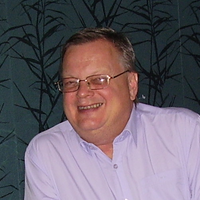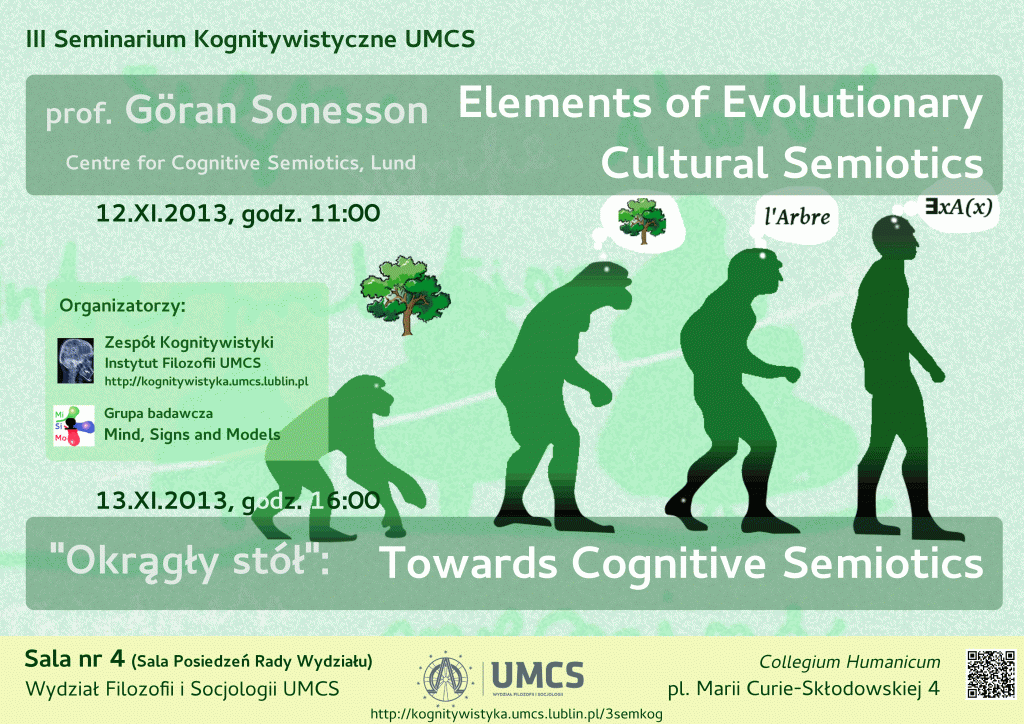[podstrona w aktualizacji]
III Otwarte Seminarium Kognitywistyczne UMCS
organizowane przez:
- Grupę Badawczą Mind, Signs and Models oraz
- Instytut Filozofii UMCS
odbędzie się w dn. 12-13.XI.2013, budynek Collegium Humanicum, pl. Marii Curie-Skłodowskiej 4, s.4 (sala obrad Rady Wydziału FiS)
Gościem i uczestnikiem III Seminarium będzie prof. Göran Sonesson, badacz z Centre for Cognitive Semiotics działającego przy Lunds Universitet (Szwecja). W ramach otwartej części Seminarium odbędą się:
- 12.XI, godz. 11:00: wykład Elements of Evolutionary Cultural Semiotics
- 13.XI, godz. 16:00: dyskusja „okrągłego stołu” pt. Towards Cognitive Semiotics
Abstrakt wystąpienia Elements of Evolutionary Cultural Semiotics:
The famous Darwinist formula of the “survival of the fittest” may, at least superficially, suggest that competition is that which drives evolution, but, in recent years, it has often been suggested that cooperation is at least as important. The act of communication, rightly understood, is a prime example of such a cooperation. Nevertheless, we cannot take serious account of cooperation without also considering the obstacles to its occurrence. I my earlier work, I have adapted the model of the Tartu school of Cultural Semiotics, according to which there is an elementary distinction in all cultures between (our own) Culture and Non-culture, forming a border over which artefacts can only pass with difficulty and/or changing their meaning. It turns out that Edmund Husserl, in his late work, proposed a parallel distinction within the Lifeworld, the world taken for granted, between Homeworld and Alienworld. This can then be taken as an invariant structure, which will be realised in one or other form in any possible Lifeworld. Availing myself of the theory of empathy, as applied to cultures, I have extended this Canonical model, made up of the Homeworld and a first kind of Alienworld, called Ego-culture and Alius-culture, respectively, to include a second kind of Alienworld, the Alter-culture, which is what I called the Extended model. From point of view of the Ego, normally situated within culture, Alter is an other that is another Ego, whereas Alius can never be an Ego, but retains an essential Thingness. You are “on speaking terms”, in fact within a collaborative process in general, with Alter, but Alius is somebody out there about whom you can at the most be talking. The distinction between Ego and Alius is readily understood in terms of evolutionary theory, not, of course, in the popular version that features “selfish genes”, but in the version that recognizes the possibility of Group selection. It has been shown by Sober & Wilson that, in the evolutionary game, egoists will always prevail over altruists, the latter being at the end eliminated, but when selection operate on groups, the altruist group will gain the upper hand over the egoist one. But this process presupposes the opposition between groups, that is, a world in which Ego-culture is opposed to Alius-culture. Homeworld and Alienworld are thus at the beginning of deep history. It is less clear how Alter-culture can be explained in terms of evolution, in the sense of genetic evolution. According to other representatives of contemporary evolutionary theory, such as Richerson & Boyd, cultural evolution may well be selected for, and even have consequences for genetic evolution, once its comes of its own. In part, however, cultural evolution could follow the same rules as genetic evolution. To explain the feasibility of Alter-culture, nevertheless, a higher degree of “semiotic freedom” seems to be called for.
„Okrągły stół”: Towards Cognitive Semiotics
TBA
Po prezentacji stanowisk zaproszonych gości (10-15 min.) będzie czas na dyskusję między uczestnikami „okrągłego stołu” oraz na odpowiedzi na pytania publiczności.
 Göran Sonesson jest profesorem semiotyki na Uniwerstecie w Lund oraz jednym z twórców i dyrektorem Centre for Cognitive Semiotics powołanym do życia w 2009 r. przy Uniwersytecie w Lund. Jest również inicjatorem semiotycznych studiów doktoranckich w Lund, które formalnie funkcjonują od 1998. Był pierwszym przewodniczącym The Swedish Society for Semiotic Studies (sffs) oraz prezydentem The Nordic Association for Semiotic Studies (NASS) 1992-2012, jak również Sekretarzem Generalnym The International Association for Visual Semiotics (IAVS/AISV) od 2001.
Göran Sonesson jest profesorem semiotyki na Uniwerstecie w Lund oraz jednym z twórców i dyrektorem Centre for Cognitive Semiotics powołanym do życia w 2009 r. przy Uniwersytecie w Lund. Jest również inicjatorem semiotycznych studiów doktoranckich w Lund, które formalnie funkcjonują od 1998. Był pierwszym przewodniczącym The Swedish Society for Semiotic Studies (sffs) oraz prezydentem The Nordic Association for Semiotic Studies (NASS) 1992-2012, jak również Sekretarzem Generalnym The International Association for Visual Semiotics (IAVS/AISV) od 2001.
Uzyskał doktoraty w zakresie: lingwistyki ogólnej (Uniwersytet w Lund) oraz semiotyki (École des Hautes Études en Sciences Sociales, Paryż). W latach 1974 – 1981 był członkiem Groupe de recherches sémio-linguistiques, kierowanej przez A.J. Greimasa, gdzie przewodniczył sekcji zajmującej się gestami.W latach 1981 i 1982 prowadził badania semiotyczne i lingwistyczne w Meksyku, w szczególności poświęcone językom i kulturze Majów. Wybrane publikacje: http://lu.academia.edu/GSonesson
W semestrze letnim 2014 prof. Sonesson będzie prowadził gościnnie zajęcia z semiotyki kognitywnej dla studentów II roku kognitywistyki.
kontakt: Piotr Konderak, kondorp[at]bacon.umcs.lublin.pl
<< Powrót do: Seminarium Kognitywistyczne

